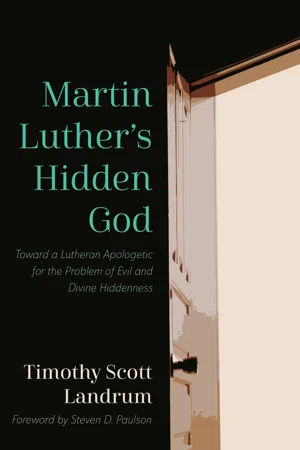![]()
chapter 1
Martin Luther’s Hidden God
Contemporary Scholarship on Luther’s Thought about God Hidden
A cluster of works have been produced that—if not in whole—at least in part are concerned with Luther’s teaching on God’s hiddenness.25 Interestingly, the scholars who penned these works emphasize that Luther believed hiddenness is an activity of God and not simply an attribute in the manner argued by Rudolph Otto in The Idea of the Holy.26 The consensus is that Luther’s strong Christology produced his stress on God’s hiddenness apart from the gospel. God hides so as not to be found in any place outside of Jesus Christ and the proclamation of the gospel.
A troubling aspect of God’s hiddenness apart from the gospel is that God appears dualistic, but Eberhard Jüngel argues against such a notion in his work God as the Mystery of the World: On the Foundation of the Theology of the Crucified One in the Dispute between Theism and Atheism. Jüngel affirms that Luther believed in only one God, not two. The alien work produced by hiddenness and the proper work produced by the gospel are both works of the same God.27 William Placher strengthens the idea in his work The Domestication of Transcendence: How Modern Theology about God Went Wrong. Placher claims that hiddenness is a mere appearance with no real substance.28
By no means do Jüngel and Placher settle the issue. Gerhard Forde, while affirming that Luther was no dualist, argues in Theology Is for Proclamation that for Luther, the distinction between God hidden and proclaimed in Jesus Christ is real and not to be minimized.29 He writes, “Thus there is a battle. It is God against God . . . The revealed God must conquer the hidden God.”30 Oswald Bayer echoes thoughts like Forde’s in his work Martin Luther’s Theology: A Contemporary Interpretation.31 Concerning the divide between God hidden and proclaimed and the mystery it creates, Bayer writes, “The decisive point in regard to the Deus absconditus does not lie simply in the experience of evil but in the fact that evil is imperceptibly mixed within the good.”32 Similarly, Paulson, in his work Lutheran Theology, describes the hidden God as something akin to an impenetrable silence, thus agreeing with Forde and Bayer.33
Luther’s Hidden God
“One God, two wills,” Luther shockingly asserts in The Bondage of the Will. Luther maintains that God wills the death of the sinner and, at the same time, because of Christ, does not will the sinner’s death.34 Interestingly, The Bondage of the Will, along with The Small Catechism and a few others, were the only works Luther thought worthy of use by posterity. In light of the importance Luther attached to his teaching contained in The Bondage of the Will, certain questions arise. What is the biblical basis for his teaching? What does his teaching in other works add to his assertions in The Bondage of the Will? Answers to these questions provide the threefold purpose of this chapter: to analyze the biblical material from which Luther derived his teaching, survey his teaching in The Bondage of the Will, Lectures on Jonah, Lectures on Isaiah, and Lectures on Genesis, and synthesize his understanding of the differentiation between God hidden and proclaimed.
A Biblical Basis for God hidden: An Analysis of Paul’s Use of Ps 51:1–6 in Rom 3:1–8
As one who famously confessed to being “bound by the Scriptures,”35 Luther’s teaching on God hidden and proclaimed is anchored in the Bible, specifically Paul’s theological treatise to the church in Rome. Luther writes, “This Epistle is really the chief part of the New Testament and the very purest Gospel, and is worthy not only that every Christian should know it word for word, by heart but occupy himself with it every day, as the daily bread of the soul.”36 In the epistle, Luther discovered that the righteousness of God is found in God’s words. God is justified—that is, shown to be righteous—in his words. Conversely, outside of his words, God’s will and actions cannot be justified by humanity.
Luther based his discovery on Paul’s usage of Ps 51 in Rom 3:1–8.37 He writes in a lecture on Ps 51, “God is not justified in Himself, but in His words and in us.”38 Luther again asserts in his Romans commentary, “God cannot be justified by any man, since He Himself is Righteousness, indeed, the Eternal L...
